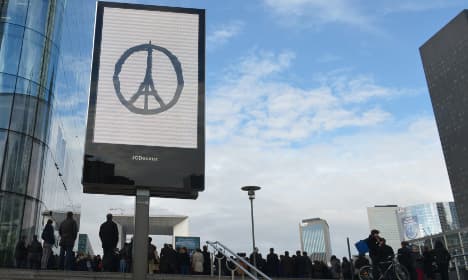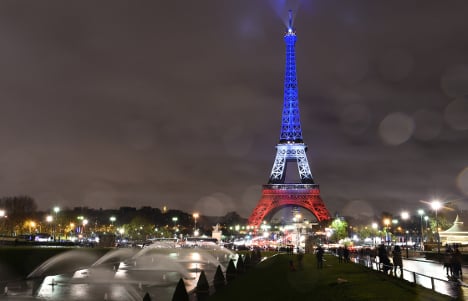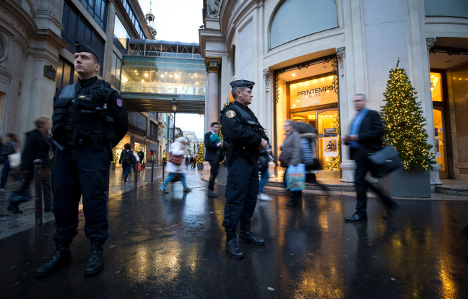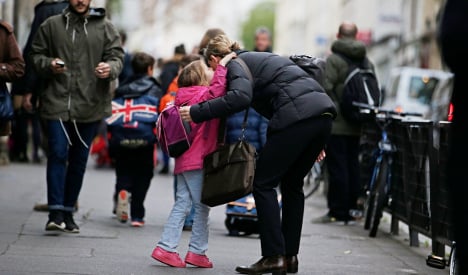How the terror attacks are impacting France

While Paris may appear to be slowly returning to normal, the terror attacks have prompted a series of knock-on effects could affect the capital and the country for a long time to come.
At first glance, Paris would seem more or less back to normal over one week on from the terror attacks.
In fact, besides the makeshift shrines dotted around the city and the increase in bag checks at shopping centres and night clubs and huge numbers of armed police and soldiers on the streets, you'd be forgiven for thinking Paris had moved on.
But often out of sight the bombs and the bullets have had a series of knock-on effects on the country and in particular the capital.
Not least the economy.
Data firm Markit has found that its composite purchasing managers index — a monthly measure of activity in 900 French businesses in the manufacturing and services sectors — had dropped to 51.3 (compared to 52.7 last month).
With a reading below 50 showing a declining activity, things perhaps aren't as bad as they seem.
"The weakening of activity as a result of the attacks has been largely confined to the companies in the service sector - hotels, restaurants, and consumers leisure services," Markit's Chief Economist Chris Williamson told The Local.
"But these things tend to be short lived, we've seen similar data from other attacks in other countries, and we expect France to bounce back in December."
 But there are also fears that investors, particularly in the Paris region will be turned off by the terror threat and look to take their money elsewhere.
Siemens chief executive Joe Kaeser said in the aftermath of the shootings that "The biggest economic damage from these attacks is on confidence, and confidence is a crucial element in this phase."
"Investment is about believing, about the future, and (when) events like that happen, people will wait," Kaeser warned.
It echoes remarks by Italian Finance Minister Carlo Padoan who said the Paris attacks could do "serious damage" to the eurozone recovery.
Philippe Gudin, analyst at Barclays added: "Attacks against civilians in a European country are likely to weigh on consumer confidence, a major risk in a situation where the main driver of growth in Europe is consumer demand."
'Investors will return'
However, others have argued that investors are unlikely to shun France, including Muriel Penicaud, managing director of Business France, which promotes French business.
"An investment is always a long-term decision linked to corporate strategy," she told the AFP news agency.
"The risk of an attack is a big concern in Europe and beyond Europe. The need to invest in countries with talent, infrastructure, markets, remains very important to companies' strategies."
Bob Lewis, the President of the Franco-British Chamber of Commerce in Paris, is confident the hit to the French economy will only be temporary.
"France's economy will see a very short-term dip, particularly in the tourism sector," he told The Local.
"But the bounce back will come fairly quickly. France is not quite as affected by massive fluctuations in house prices, if you look at the last economic crash of 2008, France's GDP dropped only very little compared to the US or the UK."
He added that France's small and medium-sized enterprises (SMEs) should remain solid as they are "very agile" and that there was a lot of growth in digital and startup businesses too, areas he noted were reactive and able to adapt.
"The biggest problem for large corporations will be security. There will be reductions in travel and more investment in digital. What we have is a security crisis that will change how everyone works.
But there are also fears that investors, particularly in the Paris region will be turned off by the terror threat and look to take their money elsewhere.
Siemens chief executive Joe Kaeser said in the aftermath of the shootings that "The biggest economic damage from these attacks is on confidence, and confidence is a crucial element in this phase."
"Investment is about believing, about the future, and (when) events like that happen, people will wait," Kaeser warned.
It echoes remarks by Italian Finance Minister Carlo Padoan who said the Paris attacks could do "serious damage" to the eurozone recovery.
Philippe Gudin, analyst at Barclays added: "Attacks against civilians in a European country are likely to weigh on consumer confidence, a major risk in a situation where the main driver of growth in Europe is consumer demand."
'Investors will return'
However, others have argued that investors are unlikely to shun France, including Muriel Penicaud, managing director of Business France, which promotes French business.
"An investment is always a long-term decision linked to corporate strategy," she told the AFP news agency.
"The risk of an attack is a big concern in Europe and beyond Europe. The need to invest in countries with talent, infrastructure, markets, remains very important to companies' strategies."
Bob Lewis, the President of the Franco-British Chamber of Commerce in Paris, is confident the hit to the French economy will only be temporary.
"France's economy will see a very short-term dip, particularly in the tourism sector," he told The Local.
"But the bounce back will come fairly quickly. France is not quite as affected by massive fluctuations in house prices, if you look at the last economic crash of 2008, France's GDP dropped only very little compared to the US or the UK."
He added that France's small and medium-sized enterprises (SMEs) should remain solid as they are "very agile" and that there was a lot of growth in digital and startup businesses too, areas he noted were reactive and able to adapt.
"The biggest problem for large corporations will be security. There will be reductions in travel and more investment in digital. What we have is a security crisis that will change how everyone works.
 Tourism badly hit
While changes to investment levels and overall business confidence may prove to be short-lived, the scene on the ground is more worrying, especially in the tourism and restaurant industries.
Airlines have reported a drop in demand for flights and Paris's iconic department stores Printemps and Galeries Lafayette have reported customer numbers tumbling by between 30 and 50 percent.
The president of the luxury arm of the hotel union Umih Prestige, Didier Le Calvez, reported a 50 percent sales drop for November, noting that the group has seen cancellations for the coming three months.
While concrete statistics about these effects are not yet available, tourist heads have gone on the offensive to encourage visitors to drop in.
"It’s normal people are scared. The images went around the world,” François Navarro, head of the Paris regional tourism board told The Local recently.
“We need to get the message out that the places frequented by tourists in Paris, whether it’s the museums, the monuments or the shops, are safe,” Navarro said.
Tourism badly hit
While changes to investment levels and overall business confidence may prove to be short-lived, the scene on the ground is more worrying, especially in the tourism and restaurant industries.
Airlines have reported a drop in demand for flights and Paris's iconic department stores Printemps and Galeries Lafayette have reported customer numbers tumbling by between 30 and 50 percent.
The president of the luxury arm of the hotel union Umih Prestige, Didier Le Calvez, reported a 50 percent sales drop for November, noting that the group has seen cancellations for the coming three months.
While concrete statistics about these effects are not yet available, tourist heads have gone on the offensive to encourage visitors to drop in.
"It’s normal people are scared. The images went around the world,” François Navarro, head of the Paris regional tourism board told The Local recently.
“We need to get the message out that the places frequented by tourists in Paris, whether it’s the museums, the monuments or the shops, are safe,” Navarro said.
 Culture hit hard
As might have been expected the attack at the Bataclan live music venue had a serious impact but cultural events such as Lyon's Fête des Lumieres have also been scrapped.
Not only were scores of concerts cancelled in the immediate aftermath of the attack but there has also been a reported 80 percent drop in tickets sales for live concerts since.
Concert halls are also facing having to fork out for extra security at the venues, a move made in part out of necessity and also to encourage fans to return.
Culture Minister Fleur Pellerin has vowed to set up a fund to help venues who are losing money through cancellations or cannot afford the extra costs.
Pellerin has promised to put culture "at the centre of the fightback".
"Terrorists dream of preventing the shows from taking place: we will simply fight them with more shows," she said.
Impact on schools
Nowhere has been more affected by the ongoing state of emergency than France's schools.
In Paris, schools are not allowed to run field trips until at least November 29th and schools from elsewhere in the country remain banned from visiting Paris.
The French government has also been advising against school trips from abroad, with many British schools deciding it is better to be safe than sorry by cancelling their visits.
British schools are now being allowed to visit other parts of France but the Paris region remains out of bounds.
Parents in France meanwhile, have been advised not to linger while dropping off their children at schools in a bid to avoid making large crowds. They have also been told not to park their cars outside schools.
Identification checks have been put in place for all visitors to schools across the country, on the advice of the Ministry for Education.
Culture hit hard
As might have been expected the attack at the Bataclan live music venue had a serious impact but cultural events such as Lyon's Fête des Lumieres have also been scrapped.
Not only were scores of concerts cancelled in the immediate aftermath of the attack but there has also been a reported 80 percent drop in tickets sales for live concerts since.
Concert halls are also facing having to fork out for extra security at the venues, a move made in part out of necessity and also to encourage fans to return.
Culture Minister Fleur Pellerin has vowed to set up a fund to help venues who are losing money through cancellations or cannot afford the extra costs.
Pellerin has promised to put culture "at the centre of the fightback".
"Terrorists dream of preventing the shows from taking place: we will simply fight them with more shows," she said.
Impact on schools
Nowhere has been more affected by the ongoing state of emergency than France's schools.
In Paris, schools are not allowed to run field trips until at least November 29th and schools from elsewhere in the country remain banned from visiting Paris.
The French government has also been advising against school trips from abroad, with many British schools deciding it is better to be safe than sorry by cancelling their visits.
British schools are now being allowed to visit other parts of France but the Paris region remains out of bounds.
Parents in France meanwhile, have been advised not to linger while dropping off their children at schools in a bid to avoid making large crowds. They have also been told not to park their cars outside schools.
Identification checks have been put in place for all visitors to schools across the country, on the advice of the Ministry for Education.
Comments
See Also
At first glance, Paris would seem more or less back to normal over one week on from the terror attacks.
In fact, besides the makeshift shrines dotted around the city and the increase in bag checks at shopping centres and night clubs and huge numbers of armed police and soldiers on the streets, you'd be forgiven for thinking Paris had moved on.
But often out of sight the bombs and the bullets have had a series of knock-on effects on the country and in particular the capital.
Not least the economy.
Data firm Markit has found that its composite purchasing managers index — a monthly measure of activity in 900 French businesses in the manufacturing and services sectors — had dropped to 51.3 (compared to 52.7 last month).
With a reading below 50 showing a declining activity, things perhaps aren't as bad as they seem.
"The weakening of activity as a result of the attacks has been largely confined to the companies in the service sector - hotels, restaurants, and consumers leisure services," Markit's Chief Economist Chris Williamson told The Local.
"But these things tend to be short lived, we've seen similar data from other attacks in other countries, and we expect France to bounce back in December."

But there are also fears that investors, particularly in the Paris region will be turned off by the terror threat and look to take their money elsewhere.
Siemens chief executive Joe Kaeser said in the aftermath of the shootings that "The biggest economic damage from these attacks is on confidence, and confidence is a crucial element in this phase."
"Investment is about believing, about the future, and (when) events like that happen, people will wait," Kaeser warned.
It echoes remarks by Italian Finance Minister Carlo Padoan who said the Paris attacks could do "serious damage" to the eurozone recovery.
Philippe Gudin, analyst at Barclays added: "Attacks against civilians in a European country are likely to weigh on consumer confidence, a major risk in a situation where the main driver of growth in Europe is consumer demand."
'Investors will return'
However, others have argued that investors are unlikely to shun France, including Muriel Penicaud, managing director of Business France, which promotes French business.
"An investment is always a long-term decision linked to corporate strategy," she told the AFP news agency.
"The risk of an attack is a big concern in Europe and beyond Europe. The need to invest in countries with talent, infrastructure, markets, remains very important to companies' strategies."
Bob Lewis, the President of the Franco-British Chamber of Commerce in Paris, is confident the hit to the French economy will only be temporary.
"France's economy will see a very short-term dip, particularly in the tourism sector," he told The Local.
"But the bounce back will come fairly quickly. France is not quite as affected by massive fluctuations in house prices, if you look at the last economic crash of 2008, France's GDP dropped only very little compared to the US or the UK."
He added that France's small and medium-sized enterprises (SMEs) should remain solid as they are "very agile" and that there was a lot of growth in digital and startup businesses too, areas he noted were reactive and able to adapt.
"The biggest problem for large corporations will be security. There will be reductions in travel and more investment in digital. What we have is a security crisis that will change how everyone works.

Tourism badly hit
While changes to investment levels and overall business confidence may prove to be short-lived, the scene on the ground is more worrying, especially in the tourism and restaurant industries.
Airlines have reported a drop in demand for flights and Paris's iconic department stores Printemps and Galeries Lafayette have reported customer numbers tumbling by between 30 and 50 percent.
The president of the luxury arm of the hotel union Umih Prestige, Didier Le Calvez, reported a 50 percent sales drop for November, noting that the group has seen cancellations for the coming three months.
While concrete statistics about these effects are not yet available, tourist heads have gone on the offensive to encourage visitors to drop in.
"It’s normal people are scared. The images went around the world,” François Navarro, head of the Paris regional tourism board told The Local recently.
“We need to get the message out that the places frequented by tourists in Paris, whether it’s the museums, the monuments or the shops, are safe,” Navarro said.

Culture hit hard
As might have been expected the attack at the Bataclan live music venue had a serious impact but cultural events such as Lyon's Fête des Lumieres have also been scrapped.
Not only were scores of concerts cancelled in the immediate aftermath of the attack but there has also been a reported 80 percent drop in tickets sales for live concerts since.
Concert halls are also facing having to fork out for extra security at the venues, a move made in part out of necessity and also to encourage fans to return.
Culture Minister Fleur Pellerin has vowed to set up a fund to help venues who are losing money through cancellations or cannot afford the extra costs.
Pellerin has promised to put culture "at the centre of the fightback".
"Terrorists dream of preventing the shows from taking place: we will simply fight them with more shows," she said.
Impact on schools
Nowhere has been more affected by the ongoing state of emergency than France's schools.
In Paris, schools are not allowed to run field trips until at least November 29th and schools from elsewhere in the country remain banned from visiting Paris.
The French government has also been advising against school trips from abroad, with many British schools deciding it is better to be safe than sorry by cancelling their visits.
British schools are now being allowed to visit other parts of France but the Paris region remains out of bounds.
Parents in France meanwhile, have been advised not to linger while dropping off their children at schools in a bid to avoid making large crowds. They have also been told not to park their cars outside schools.
Identification checks have been put in place for all visitors to schools across the country, on the advice of the Ministry for Education.
Join the conversation in our comments section below. Share your own views and experience and if you have a question or suggestion for our journalists then email us at [email protected].
Please keep comments civil, constructive and on topic – and make sure to read our terms of use before getting involved.
Please log in here to leave a comment.